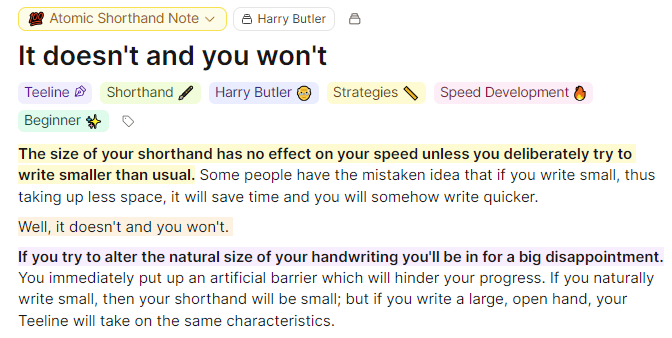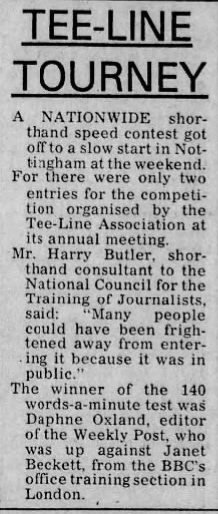LLTT Newsletter - August 2024

LLTT - August 2024
Welcome to the August edition!
In this issue, we’re going to discuss “The Critical Role of Enthusiasm in Mastering Shorthand.”
We will then hear from Renata Littlehales, a Polish-born interpreter who has written “Mastering my ‘Third’ Language.” In her quest to master English, see what led her to Teeline shorthand and discover how she used this "third language" to bridge between her native Polish and adopted English which ultimately paved the way to a rewarding career in interpreting. Her story is about the power of perseverance, the value of unconventional learning paths, and the sometimes surprising ways in which skills interconnect in our global world.
Let’s go!
The Critical Role of Enthusiasm in Mastering Shorthand
Enthusiasm is indeed critical to success in mastering shorthand. It fuels perseverance, enhances enjoyment of the learning process, and helps maintain motivation over the long term. However, it's equally important not to give up too quickly if that enthusiasm isn't immediately present.
What is difficult today, with effort, becomes easier tomorrow, but you will need to experiment with different learning methods to find what works best for you. It is very easy to get stuck in one type of practice. If your revision consists solely of doing one dictation after another, it might be time to broaden your horizons. Need a start? How about “Mixing it up with Individual Sentences” or “Break it Down” from our archive?
While initial enthusiasm is valuable, perseverance in the face of challenges is more important. Too many learners give up too soon, perhaps not realising that struggle is a normal (and a very real) part of the learning process for everyone. An expert today was a novice at some point in the past. Commit to gradual improvement via consistent practice and you may find your attitude towards shorthand shifting over time.
Remember, skill development often follows a decidedly non-linear path. There will be periods of rapid progress followed by plateaus or even temporary setbacks. These are all normal parts of the learning journey. By maintaining a positive attitude and employing different learning strategies, you can develop both your shorthand skill and a genuine appreciation for the art.
With that said, let’s look at a quote from K.S. Aiyar.
“At the outset of your study, it is well to ask yourself whether you have a love of the subject. It is very difficult to make any headway without a spirit of enthusiasm which will survive and not vanish at the sight of the first obstacle. Take a passionate interest in your study, and half your battle is won. Without the element of pleasure, work loses its character of joyous activity. No great object was ever achieved without the driving force of earnestness. Unfortunately, many a student allows his zeal to be extinguished only too soon. If you aspire to take a place among the ranks of fast writers, you have every need of an abundance of enthusiasm which should always be kept at the glowing point.”
As Aiyar wisely noted, "… it is well to ask yourself whether you have a love of the subject." This underscores a fundamental truth: having a genuine interest in shorthand can be the driving force behind successful learning and mastery.
The Power of Intrinsic Motivation
Intrinsic motivation, or the internal desire to pursue a goal for its inherent satisfaction, is a powerful factor in learning. When you're genuinely interested in shorthand (and all that it entails), you are far more likely to persist through the inevitable challenges and find more enjoyment in the learning process.
Resilience in the Face of Obstacles
Like any valuable skill, learning shorthand comes with its share of challenges. Aiyar emphasises the need for "a spirit of enthusiasm which will survive and not vanish at the sight of the first obstacle." The ability to maintain motivation despite setbacks is a key trait of all successful learners. Each challenge overcome not only improves your shorthand but also builds additional capacity for perseverance.
Cultivating Passion and Joy in Learning
"Take a passionate interest in your study, and half your battle is won." This can transform the learning process from a chore into an engaging journey. When you approach shorthand with genuine interest, you're more likely to enter a state of "flow" - a condition of deep engagement and enjoyment that often accompanies peak performance.
The Importance of Sustained Effort
That said, it is no surprise to anyone who has studied shorthand that mastering it requires consistent effort over time. Aiyar notes, "Unfortunately, many a student allows his zeal to be extinguished only too soon." See “Excellence Before Speed.”
But What If Enthusiasm Is Hard to Find?
It's natural to feel discouraged or to struggle with maintaining enthusiasm, especially when progress seems slow. However, it's important to recognise that interest and enjoyment often grow with increasing competence.
Here are some strategies to help build and maintain motivation:
You should set achievable micro-goals to create a sense of progress. This should also extend beyond speed goals. As an example, a micro-goal would be to strive for better clarity in your writing, even if it means slowing down a bit to get there. Celebrate small victories to reinforce positive associations with learning.
Connect shorthand practice to your personal interests or future goals. Seek opportunities for early application of skills, even in low-stakes situations.
Keep a record of your progress to help you visualise improvement over time. Create a "progress journal" where you document your achievements, no matter how small.
Explore the history and evolution of shorthand. Understanding its rich background can deepen your appreciation for the skill.
Set up a dedicated, comfortable study space that you associate with positive learning experiences.
Take care of your physical health. Regular exercise, proper nutrition, and adequate sleep can significantly impact your cognitive abilities and overall enthusiasm.
Mastering shorthand is a rewarding journey that offers benefits far beyond the skill itself. It develops cognitive abilities, improves note-taking efficiency, and can even enhance career prospects. So, whether you're naturally enthusiastic about shorthand or working to cultivate that enthusiasm, you must keep pushing forward. Your future self will thank you for the valuable skill you've developed and the perseverance you've demonstrated along the way.
Don't be quick to decide you 'don't have it in you.' Often, it's just a matter of finding a different approach and giving yourself time to build momentum.
For more on finding your “why” see “How I Make Habits Stick”.

Mastering my ‘third’ language
My name is Renata Littlehales. I come from Poland and at the age of 23, owing to personal circumstances, I came to England. It was 1992. At the time I spoke some English learnt mainly through secondary schooling and university. However, upon arrival to Stafford, my current home, I very soon realised that my language skills needed improving if I was to settle and enjoy living in England.
I was pleased to learn that there was a college in Stafford which offered various courses. ESOL (English for Speakers of Other Languages) was one of them. The tutorials helped my written and spoken English, however, I longed for something yet more challenging that would benefit my second language further.
At the time, as a non-EU citizen I was entitled to attend 15 hours of college classes of my choice. Having selected a number of secretarial tutorials I was left with three hours spare. This is how I came across shorthand classes. And this is how I met Jo Goodall. She was the course leader. I did not know much about Teeline shorthand however, I was curious and impressed only after the first evening tutorial and knew instantly that I would strive to complete the course if only to improve my English language skills.
It goes without saying that all of the initially undertaken courses formed a solid foundation and proved very helpful when learning Teeline shorthand. In addition, my husband, Frank, would help me practise my shorthand speed and accuracy by reading articles from newspapers. I vividly recall how some of those family sessions led to both great laughter and at times even greater frustration. It took me a number of years to reach (one of) the highest levels of shorthand testing, achieving 110 words per minute. Having said that, I consider the time spent learning the skill of shorthand most beneficial and satisfying. Yes, I did face challenges. These, however, were useful ones. English spelling, multiple word meaning, silent letters to name a few were always there when transcribing shorthand into longhand. Regular and consistent practice was helpful in overcoming them.
In 2004, Poland joined the European Union and over the subsequent years the demand for Polish language in England increased. In 2010, I applied to attend DPSI (Diploma in Public Services Interpreting) course. I was accepted based upon my academic achievements and professional experience. I was advised at the time that shorthand and interpreting had one thing in common - the ability to remember a large quantity of information and transform it into written or spoken words in a fast and an accurate manner.
I may not use Teeline shorthand as such in my daily work as an interpreter. However, I do apply the practical side of it. I am able to multitask by listening to what is being said, remember the information, understand it, make ample notes and convey it into Polish and/or English. The greater the speed, the greater the challenge.
I became a public interpreter mainly due to the demand for my mother tongue. By the time I had obtained my interpreting qualifications I had lived in England almost as long as I had lived in Poland. I was familiar with both countries’ culture, social, economic and political systems and was able to communicate fluently in the two languages. Thus, working for the court system and the police was a natural and correct step forward. Yes, I did and still do come across various language and system complexities. Verbatim translation sometimes achieves confusing results. However, as an interpreter I am bound to mainly convey accurately the meaning of the spoken or written word, and I do apply my best skills to deliver the expected results.
In time you develop your own techniques to ensure that your notes are reliable and accurate. Speed comes only through practice. Interpreting radio news or TV interviews are just a few flexible and effective ways available.
Concentration also plays a key role in ensuring accuracy and speed while taking notes in shorthand. There are often high-pressure situations where your ability to keep up will require your concentration at its best. Again, this technique can only be improved through repeated shorthand exercise.
Overall, I consider all of my academic achievements a success. I have enjoyed my subsequent careers as a researcher, writer and an interpreter.
The advice I would give to students who are interested in learning Teeline shorthand is to simply try it, take it step by step, practise it and never worry about any setbacks.
Shorthand is still used in some professions. It is a valuable skill for note-taking, transcribing, and rapid writing in fields like journalism, court reporting, and business.
One way or the other, motivation and determination are the traits needed to succeed. As for the speakers of other languages, it is important to remember that Teeline is in its own right simply another language. Once you have learnt one you may wish to acquire a new one.
On a finishing note, I would like to express my particular gratitude to Jo Goodall for introducing me to Teeline shorthand and supporting me on the great journey to mastering this skill.
Thanks for reading!
Be sure to visit us at the LLTT Website, YouTube, Facebook, Instagram, Quizlet and Soundcloud.
ICYMI: Recently published!
If you’re looking for Teeline reading practice, Let’s Love Teeline Together is pleased to introduce a new Teeline learning resource!
Skill Building Through Reading 📗 - now available for purchase online.

Much work (and ❤️!) has gone into this 48 page, 6”x9" softcover book:
Five 5️⃣ carefully selected passages: Improve your sight 👁️ recognition of outlines and word groupings.
Dual Format: Each passage includes both printed Teeline and the longhand ✍️ transcription.
Proven Learning Approach: Reading printed 🖨️ shorthand is a method long-favoured by skilled practitioners.
Whether you're a student, journalist, or professional seeking to improve your note-taking, this book will be a valuable addition to your Teeline learning resources.
To order, please visit the book’s landing page or respond to this email with any questions.
We have been considering releasing this as a PDF as well if there is enough interest. Please contact us to cast your vote: https://www.letsloveteelinetogether.com/contact-us.
If you find this newsletter helpful, please help us spread the word and forward to a friend!
A Parting Thought
Harry Butler…on outline size.

Teeline History - From 1975

"Don't Get Worried. Don't Get Stressed. Let's Love Teeline Together."

Add a comment: